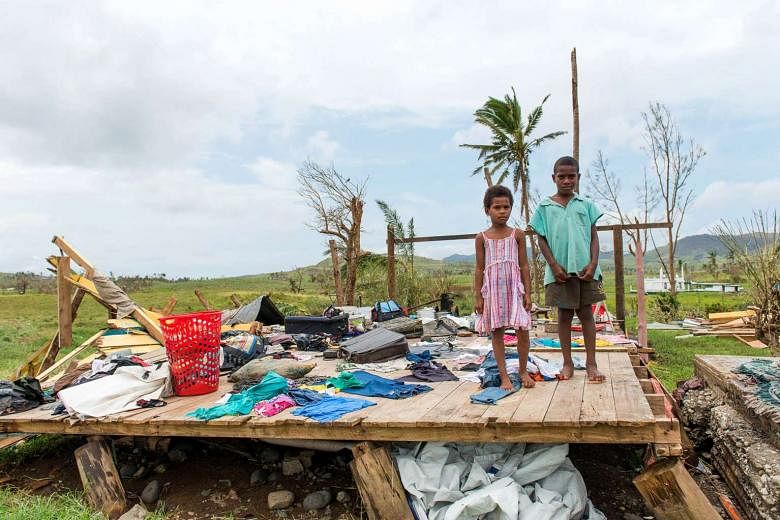SUVA/SINGAPORE - Children who lived through Cyclone Winston, which barrelled through Fiji last Saturday (Feb 20),could bear emotional scars which could take years to heal, said Save the Children.
The non-governmental organisation said in a statement on Wednesday (Feb 24) that around 120,000 children were within 50 km of Cyclone Winston's direct path during the category 5 storm, the strongest force to strike Fiji to date. The cyclone ripped up houses, uprooted trees and sent debris flying when it cut across the South Pacific country, flooding low-lying villages. The storm which reached speeds of up to 325 km an hour, claimed 42 lives in its wake.
"This is an enormous tragedy in Fiji," said Fiji CEO Iris Low-McKenzie, in an email reply to The Straits Times from the Fijian capital, Suva.
"Our nation has never faced anything like this before, and we still don't know the full extent of the storm's impact. But what we do know is that the recovery process will take many, many months as families who have lost their homes and livelihoods slowly rebuild," she added. "Aid agencies like Save the Children are doing our best to support these families."
Save the Children warned that unless children who experienced the wrath of Cyclone Winston receive the right psychosocial support in the coming weeks and months, they could carry with them the emotional scars of the natural disaster for years as their traumatised experience could have a lasting impact on them.
"It is really important that children receive extra care and support right now, that they feel safe and loved so they can start to deal with what they have been through," said Save the Children Fiji CEO Iris Low-McKenzie.
"Alongside lifesaving aid like food, water and healthcare, we need to ensure that children do not continue to be traumatised and distressed by what they have experienced."
More than 34,000 people remain in evacuation centres across the country, including at least 30 schools. Save the Children will set up 'child friendly spaces' in many of the evacuation centres to provide the youngsters with a safe place to play, socialise with other children and take part in educational activities.
"This unique support in a time of heightened stress and anxiety helps them forget about what they have been through, while also giving parents a much-needed opportunity to return home, assess the damage, and start the rebuilding process," Ms Low McKenzie explained.
"In a situation like this, it's quite amazing to see children having fun, singing songs and taking part in educational activities. There's nothing like the sound of shrieking laughter to help lift spirits at a time like this."
As well as implementing 'child friendly spaces', Save the Children will work with the United Nations Children's Emergency Fund (UNICEF) to set up temporary classrooms to help get schools up and running after scores of schools were destroyed by the storm. The charity will also distribute school kits to students to prepare them for their return to school. The NGO is also planning to implement a cash for work programme, and carry out vital water and sanitation activities at schools and evacuation centres.
Health and aid agencies fear that the stagnant water left behind by the flooding could turn into a breeding ground for mosquitoes which can cause dengue fever and other diseases, further complicating recovery efforts.

